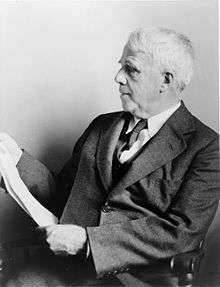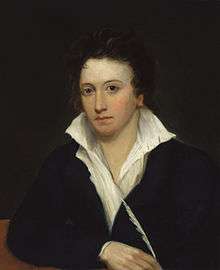
Translation it is that openeth the window, to let in the light; that breaketh the shell, that we may eat the kernel; that putteth aside the curtain, that we may look into the most Holy place; that removeth the cover of the well, that we may come by the water.
—King James Bible (The Translators)
—King James Bible (The Translators)

Poetry is what is lost in translation.
—Robert Frost
—Robert Frost

The plant must spring again from its seed, or it will bear no flower.
—Percy Bysshe Shelley
—Percy Bysshe Shelley
Translation is the communication of the meaning of a source-language text by means of an equivalent target-language text.
Quotes
- Translators are the shadow heroes of literature, the often forgotten instruments that make it possible for different cultures to talk to one another, who have enabled us to understand that we all, from every part of the world, live in one world.
- Translation is at best an echo.
- George Borrow, Lavengro (1851), Ch. 25, p. 151.
- I will venture to assert, that a just translation of any ancient poet in rhyme is impossible. No human ingenuity can be equal to the task of closing every couplet with sounds homotonous, expressing at the same time the full sense, and only the full sense of his original.
- William Cowper, The Iliad of Homer: translated into English blank verse (1791), Preface.
- Compare: "Though it may be true, that no translation of an ancient poet in rhyme can be faithful, yet experience has proved that no translation, except in rhyme, will ever be read." Robert Lynam, The British Essayists, Vol. XVIII (1827), Preface, p. xxi.
- Such is our pride, our folly, or our fate,
That few but such as cannot write, translate.- John Denham, To Sir Richard Fanshaw, Upon his Translation of Pastor Fido (1648), line 1.
- Nor ought a genius less than his that writ
Attempt translation.- John Denham, To Sir Richard Fanshaw, Upon his Translation of Pastor Fido (1648), line 9.
- I conceive it is a vulgar error in translating poets, to affect being fidus interpres... [for] poetry is of so subtile a spirit, that in the pouring out of one language into another, it will all evaporate; and if a new spirit be not added in the transfusion, there will remain nothing but a caput mortuum, there being certain graces and happinesses peculiar to every language, which give life and energy to the words... therefore if Virgil must needs speak English, it were fit he should speak not only as a man of this nation, but as [a] man of this age.
- John Denham, The Destruction of Troy (1656), Preface.
- No man is capable of translating poetry, who, besides a genius to that art, is not a master both of his author's language and of his own; nor must we understand the language only of the poet, but his particular turn of thoughts and expression, which are the characters that distinguish, and as it were individuate him from all other writers. When we are come thus far it is time to look into ourselves, to conform our genius to his, to give his thought either the same turn, if our tongue will bear it, or, if not, to vary but the dress, not to alter or destroy the substance.
- John Dryden, Preface to Ovid's Epistles (1680).
- A good poet is no more like himself in a dull translation than his carcass would be to his living body.
- Many things which go under my name are badly translated from the German or are invented by other people.
- Albert Einstein, The Ultimate Quotable Einstein (2010), p.26
- You've often heard me say – perhaps too often – that poetry is what is lost in translation. It is also what is lost in interpretation. That little poem means just what it says and it says what it means, nothing less but nothing more.
- Robert Frost, A Backward Look, by Louis Untermeyer (1964), p. 18.
- Literal translation of poetry is in reality a solecism. You may construe your author, indeed, but if with some Translators you boast that you have left your author to speak for himself, that you have neither added nor diminished, you have in reality grossly abused him, and deceived yourself. Your literal translation can have no claim to the original felicities of expression; the energy, elegance, and fire of the original poetry. It may bear indeed a resemblance, but such a one as a corps in the sepulchre bears to the former man when he moved in the bloom and vigour of life.
was the taste of the Augustan age. None but a Poet can translate a Poet.Nec verbum verbo curabis reddere, fidus
Interpres——- William Julius Mickle, The Lusiad; Or, The Discovery of India: an Epic Poem (1776), Introduction, pp. cxlix–cl.
- It was not to gratify the dull few, whose greatest pleasure in reading a translation is to see what the author exactly says; it was to give a poem that might live in the English language which was the ambition of the Translator. ... And the original is in the hands of the world.
- William Julius Mickle, The Lusiad; Or, The Discovery of India: an Epic Poem (1776), Introduction, p. cli.
- It is frustrating to be translating other people's autobiographies whilst mine is lying unpublished, banned by the Home Office.
- Dennis Nilsen, as quoted in Exclusive: Dennis Nilsen: My Prison Life of Drink and Drugs, Mirror.co.uk (27 August, 2005)
- Translations [into the German language], even the best ones, proceed from a mistaken premise. They want to turn Hindi, Greek, English into German instead of turning German into Hindi, Greek, English. ... The basic error of the translator is that he preserves the state in which his own language happens to be instead of allowing his language to be powerfully affected by the foreign tongue.
- Rudolf Pannwitz, Die Krisis der europäischen Kultur (1917), as translated in Walter Benjamin, Selected Writings: Volume 1, 1913-1926 (1996), pp. 261-262.
- The translator of a poem is only a transient mediator... in time all translations fall away, fade, become literary curiosities, time-bound and largely of scholarly rather than literary interest.
- Burton Raffel, The Art of Translating Poetry (1988), p. 182
- That translation is the best which comes nearest to giving its modern audience the same effect as the original had on its first audiences. Just to illustrate that, may I use a rather crude example from modern French? French novelists often represent married couples as calling each other mon chou, which I don't think would strike a Frenchman as funny at all. If you translate that into English by the words, 'my cabbage,' you're going as far as possible as you can from the principle of equivalent effect. In fact, you're making the English reader think that Frenchmen are silly, which is the last thing that you should do. [...] The word [paraphrase] is much misused, by the way; it is often used as a term of abuse for very good translation. I should put it in this way, that it is permissible only where literal translation is liable to obscure the original meaning. I would go further and say that on such occasions it is not only permissible, but it is imperative, and therefore it becomes good translation, and the word 'paraphrase' should disappear.
- E. V. Rieu, "Translating the Gospels: A Discussion Between Dr. E.V. Rieu and the Rev. J.B. Phillips", The Bible Translator 6/4 (October 1955), pp. 153 & 157.
- Hence the vanity of translation; it were as wise to cast a violet into a crucible that you might discover the formal principle of its colour and odour, as seek to transfuse from one language into another the creations of a poet. The plant must spring again from its seed, or it will bear no flower—and this is the burthen of the curse of Babel.
- For Pound, translation opens up possibilities for creating a new compound out of old elements; for Nabokov it is a grudgingly admitted, inevitable evil.
- Julia Trubikhina: The translator's doubts: Vladimir Nabokov and the ambiguity of translation. Academic Studies Press. 2019.
- Humour is the first of the gifts to perish in a foreign tongue.
- How shall men meditate in that which they cannot understand? How shall they understand that which is kept close in an unknown tongue? [...] Translation it is that openeth the window, to let in the light; that breaketh the shell, that we may eat the kernel; that putteth aside the curtain, that we may look into the most Holy place; that removeth the cover of the well, that we may come by the water.
- The King James Bible (Authorized Version, 1611), 'The Translators to the Reader'
External links
This article is issued from
Wikiquote.
The text is licensed under Creative
Commons - Attribution - Sharealike.
Additional terms may apply for the media files.